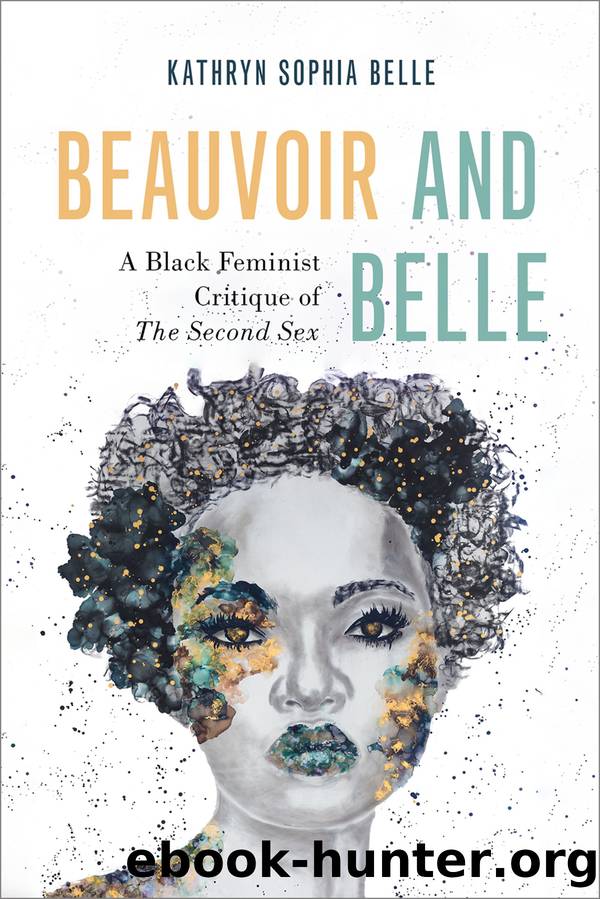Beauvoir and Belle by Kathryn Sophia Belle;

Author:Kathryn Sophia Belle;
Language: eng
Format: epub
Publisher: Oxford University Press USA
Published: 2024-07-15T00:00:00+00:00
Here Beauvoir is not only comparing the ways in which the ambitions of American Black (men) and (white) women are discouraged and/or denied altogether, she is also calling attention to the external and internal struggles within oppressed groups, specifically (white) women, Black American (men), and also Black African (men) who come to France. This is one of the few instances when Beauvoirâs focus on the race/gender analogy is not primarily on Black (men) in America, insofar as she also names Black (men) from Africa coming to France. Still, she persists in contrasting the experiences of (white) women with Black (men) without mention of Black women. Before examining critiques of this analogical approach to racial and gender oppression, let us take up a few more considerations of the influences between Wright and Beauvoir, and then between G. Myrdal and Beauvoir.
In âOwned Suffering: Thinking the Feminist Political Imagination with Simone de Beauvoir and Richard Wrightâ (2000), Vikki Bell argues, âDe Beauvoirâs use of Wright is heuristic not sociological, rhetorical not empirical, and it is in this sense that the argument functions to strengthen de Beauvoirâs point through association.â32 Unlike Bell, who emphasizes Wrightâs influence on Beauvoir in terms of âWrightâs sociological thoughtâ and âhis broadly Marxist perspective,â Margaret Simons emphasizes Wrightâs philosophical contributions and impact on Beauvoir.33 She argues that âWrightâs influence on Simone de Beauvoirâs philosophy, [includes] . . . providing her with a theory of racial oppression and liberation that she utilized as a model in constructing the theoretical foundations for radical feminism in The Second Sex.â34 Simons reads Wright and Beauvoir as holding âa shared concept of the oppressed Otherâ as well as a similar âfocus on the importance of social relations and recognition in the formation of the self.â35 Furthermore, both theorists use phenomenological descriptions of oppression in an effort to challenge pernicious stereotypes.36
For Simons (contra V. Bell), âWrightâs phenomenological descriptions of black experience of oppression provide a methodological alternative to both [G.] Myrdalâs objectifying social science methodology and the economic reductionism of Marxist orthodoxy.â37 Simons explains, âWrightâs philosophical influence on Beauvoir is a subjectivist, phenomenological approach to the study of oppression . . . describing the lived experience of American racism from the standpoint of the oppressed.â38 And then she elaborates, âWright provides a phenomenology of racial oppression to challenge the claims by segregationists that blacks are happy and contented with their naturally inferior place in society, much as Beauvoir, in the second volume of The Second Sex (entitled Lived Experience), relies on a phenomenological description of womenâs experience to challenge the oppressive stereotypes of popular myths and Freudian psychology.â39
As with Beauvoir and A. Myrdal, there are noteworthy similarities and differences between Beauvoir and G. Myrdal. While Simons thinks that Wright probably introduced Beauvoir to An American Dilemma, biographer Deirdre Bair points out that Beauvoir received a copy of the text from Nelson Algren in 1947.40 Beauvoir writes about the text in letters to Algren in which she reflects on what she learns from G. Myrdal about Black people and notes the analogies between Black people and women.
Download
This site does not store any files on its server. We only index and link to content provided by other sites. Please contact the content providers to delete copyright contents if any and email us, we'll remove relevant links or contents immediately.
The European History Highway: A Guide to Internet Resources by Dennis A. Trinkle Scott A. Merriman(492)
The Seven Wonders of the Ancient World by Michael Denis Higgins(475)
European Security without the Soviet Union by Stuart Croft Phil Williams(468)
European Security in a Global Context by Thierry Tardy(467)
The Routledge companion to Christian ethics by D. Stephen Long Rebekah L. Miles(457)
Hudud Al-'Alam 'The Regions of the World' - a Persian Geography 372 A.H. (982 AD) by V. V. Minorsky & C. E. Bosworth(398)
Gorbachev And His Generals by William C. Green(390)
Get Real with Storytime by Julie Dietzel-Glair & Marianne Crandall Follis(388)
Tibetan Studies in Comparative Perspective by Chih-yu Shih Yu-Wen Chen(385)
Governance, Growth and Global Leadership by Espen Moe(380)
Hyperculture by Byung-Chul Han(374)
CliffsNotes on Fitzgerald's The Great Gatsby by Kate Maurer(359)
The Oxford History of the World by Fernández-Armesto Felipe;(353)
How Languages Are Learned 5th Edition by Patsy M Lightbown;Nina Spada; & Nina Spada(352)
The Egyptian Economy, 1952-2000 by Khalid Ikram(349)
Oral Poetry and Narratives from Central Arabia: The Poetry of Ad-Dindan : A Bedouin Bard in Southern Najd (Studies in Arabic Literature, Vol 17) (English and Arabic Edition) by P. M. Kupershoek P. Marcel Kurpershoek(340)
The Oxford Handbook of the Incas by Sonia Alconini(333)
Europe Contested by Harold James(319)
The Hutchinson Dictionary of Ancient and Medieval Warfare by Peter Connolly John Gillingham John Lazenby(303)
